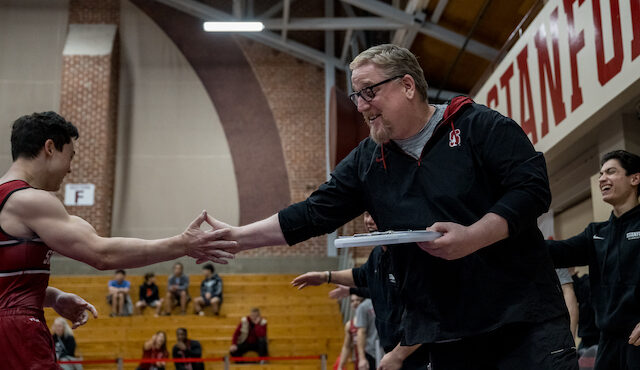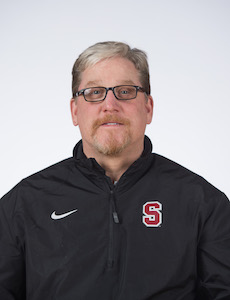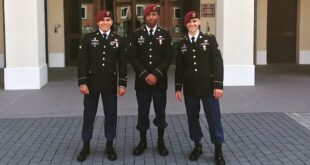
Growing up watching old kung-fu martial arts movies, Thomas Glielmi started teaching himself how to do flips from trees, fences and garages.
“I liked the adrenaline rush,” the 59-year-old recalls.
That drive led Glielmi to join a men’s gymnastics team in high school, which set him on a course to forge an uber-successful career as a gymnastics coach over the last two decades.
As head coach for Stanford University men’s gymnastics since 2002, Glielmi guided his athletes to clinch seven NCAA championships, including the last five.

As head coach for the U.S. men’s gymnastics team, Glielmi helped lead Team USA to a fifth-place finish at the 2020 Tokyo Olympics. At the 2024 Paris Olympics, Stanford athletes will comprise nearly half the national team.
Glielmi grew up in Calumet Park, Illinois, in Chicago’s south suburbs. His paternal grandparents immigrated from a village in Italy’s Campania region, where Glielmi says he would like to visit his cousins someday. “Other than ‘hello,’ ‘goodbye,’ ‘very good,’ ‘cheers’ and ‘shut up in the house,’ I do not speak Italian,” he says. “I do know how to order Italian food, though.”
He started teaching beginner classes while he was still in high school, then earned a partial scholarship at Southern Illinois University in Carbondale, where he was a Division 1 gymnast. While in college, he continued coaching during the summer, and when he graduated, he started getting coaching-job offers. “I planned on going into radio or television as a writer, but with the offers to coach, I opted to give that a try,” he recalls.
As a gymnast, Glielmi’s best events were floor and vault. His favorite, however, is parallel bars, because of the many skills that come into play and sequences that can be done on the apparatus, he says.
To be great gymnasts, athletes must possess all the qualities needed to succeed in any sport — discipline, maturity, intelligence, motivation and passion — but also have a genetic predisposition to be strong and flexible, Glielmi says.
Great coaches need to know the sport “inside and out,” be consistent, communicate well, and set clear expectations. That latter is a trait he responded well to in his days as an athlete, says Glielmi, who has been named the College Gymnastics Association’s National Coach of the Year seven times.
Certainly, there is a difference in coaching college athletes versus the national team, Glielmi says.
“I have complete authority with the collegiate team. I am the head coach and am responsible for the team’s success or failure,” he explains. “With Team USA, there can be athletes from different universities and different gyms. Their coaches are also part of Team USA, so each coach has input into the team’s work, progress and other aspects of putting together a team. There are only two coaches on the floor at most competitions, so coaches need to know how to best help each athlete, even if they are not an athlete from their program.”
The development of gymnastics equipment has allowed for progressively more advanced elements over the years, Glielmi says. “There is always another flip, or another twist or new sequence that can be done. It’s contagious once you start learning skills,” he says. “Also, there are more very knowledgeable coaches, so we see some junior kids that are extremely good at a young age.”
Gymnastics is a great first sport for kids, even if they go on to pursue other sports, because of the unmatched strength, flexibility, coordination and discipline that beginning gymnastics builds, Glielmi says.
In the end, sports are simply a tool for life, Glielmi notes. “The challenges brought about from participating in sports help one develop character, a proper work ethic, goal setting and how to manage both success and failure,” he says.
With such an accomplished resume, the answer Glielmi gives when asked which achievement he’s most proud of is most telling.
“I have had a 100% graduation rate,” the coach says. “Every athlete I’ve coached in the collegiate ranks has graduated.”
The above appears in the August 2024 issue of the print version of Fra Noi. Our gorgeous, monthly magazine contains a veritable feast of news and views, profiles and features, entertainment and culture. To subscribe, click here.
 Fra Noi Embrace Your Inner Italian
Fra Noi Embrace Your Inner Italian






